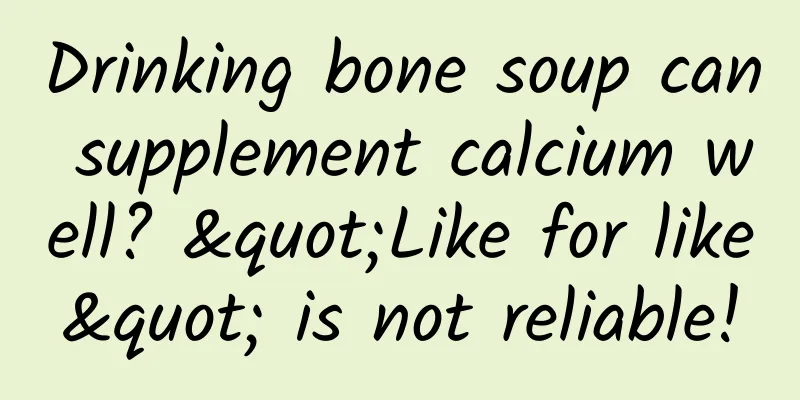Drinking bone soup can supplement calcium well? "Like for like" is not reliable!

|
Can bone soup provide calcium? The calcium in bones is very difficult to dissolve in water, so the calcium contained in bone soup, which is regarded by many as a good calcium supplement, is very small. >> Written by reporter Liao Mailun Edited by Chen Yongjie New media editor Li Hui Interview experts: He Li (Researcher, Institute of Nutrition and Health, Chinese Center for Disease Control and Prevention) Calcium is an essential mineral for the human body. If it is deficient for a long time, it is easy to cause abnormal physiological functions and structures of the human body, and even cause a variety of diseases. Therefore, more and more people begin to buy various calcium supplements to supplement calcium. However, many people think that calcium tablets and other supplements are expensive and taste bad, so they prefer to use "food supplements", such as the widely circulated "drinking bone soup to supplement calcium". But does this method really work? Before answering this question, let's do a small test. If you were asked to choose a food with the least calcium among shepherd's purse, bone soup, and sesame paste of equal quality, which one would you choose? Perhaps the correct answer will surprise many people. It is bone soup, which is regarded by many as a good calcium supplement. In fact, the calcium contained in bone soup is very small. Because the calcium in bones exists in the form of calcium hydroxyphosphate, which is extremely difficult to dissolve in water; the general soup-making method is difficult to dissolve the calcium salt in the bones, so even after a long period of cooking, the dissolved calcium is still very limited. Scientific measurements show that a bowl of 100 ml of pork bone soup contains only 1 to 2 mg of calcium. According to the recommendations in the 2022 edition of the Dietary Guidelines for Chinese Residents, for people over 18 and under 50, the recommended daily calcium intake is 800 mg, which is far from the 1 to 2 mg that bone soup can provide. If you want to rely solely on bone soup to meet your daily calcium intake needs, you may have to drink at least 400 bowls of bone soup a day, which is indeed an almost impossible task for ordinary people. Even if there is a big stomach king who can accomplish the "feat" of "drinking more than 400 bowls of bone soup in one breath" and reach the recommended daily intake of calcium, the result is often not worth the loss. It will not only increase the burden on your own digestive system, but it is also likely to cause increased blood lipids and uric acid. This is because the fat and purine content in bone soup is very high, and it is not suitable for excessive one-time intake or long-term drinking . Excessive intake of the former can easily cause increased blood lipids; the latter will become uric acid after oxidation, and excessive storage in the human body may cause hyperuricemia, thereby increasing the risk of gout. It can be seen that bone soup is not a good way to supplement calcium. So, what is more suitable for calcium supplementation? He Li, a researcher at the Institute of Nutrition and Health of the Chinese Center for Disease Control and Prevention, said: " For most people, dairy products are the first choice for calcium supplementation . Every 100 grams of milk contains about 100-120 mg of calcium. It not only has a high calcium content, but also contains ingredients such as lactose and casein phosphopeptides that can promote calcium absorption. At the same time, milk is rich in protein and plays an important role in supplementing other micronutrients in the human body (such as vitamin A, potassium, B vitamins, etc.). Although the same mass of sesame paste contains 1170 mg of calcium, it contains a lot of fat, so we do not recommend consuming too much sesame paste because it will bring serious "energy threats" and increase the risk of obesity." However, for people who do not like to drink milk, they can also choose to consume more soy products such as tofu, aquatic products such as fish and shrimp, and green vegetables . For example, shepherd's purse mentioned in our small test is a vegetable with a high calcium content. The calcium content of every 100 grams of shepherd's purse is as high as 294 mg. "If you don't like the taste of shepherd's purse, you can also choose green vegetables such as mustard, lettuce, rapeseed, alfalfa, broccoli, etc. They can also achieve good calcium supplementation effects." He Li introduced. |
>>: Methylcobalamin, what is it used for and who needs to take it?
Recommend
Will long-term moxibustion cause gynecological inflammation?
Almost the vast majority of women have experience...
Pay attention to pelvic floor health and enjoy a healthy and beautiful life
Author: Ma Xia, deputy chief physician of Taizhou...
World Oral Health Day | These three groups of people should pay special attention to oral health!
Today is World Oral Health Day. Oral health is re...
Pictures of discharge from metronidazole suppositories
It may take about 1 to 3 days for the discharge t...
Precautions for double eyelid surgery
Cosmetic surgery and health care have almost beco...
What are some other methods of vaginal tightening besides surgery?
After marriage, especially after giving birth, th...
Can pregnant women eat inulin?
As we all know, inulin is highly nutritious and h...
Why does my lower abdomen hurt and I have a lot of vaginal discharge?
When women have abnormal leucorrhea, they should ...
What causes redness and swelling of the vulva?
In daily life, it is a very common phenomenon for...
Anemia, what are the misunderstandings about iron supplementation
Iron is an important essential trace element for ...
Can I really jump rope during menstruation?
We all know that women are not suitable for stren...
Vaginal packing hemostatic absorbent plug
The existing vaginal packing and blood-activating...
Women's risk of heart disease increases: Six types of people should pay special attention
Statistics show that women are increasingly susce...
Can blocked vas deferens be cured?
Vas deferens obstruction is a relatively common m...









